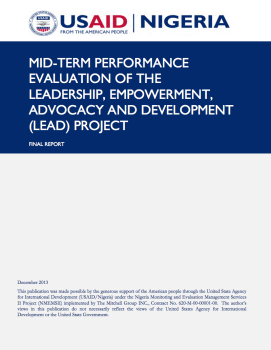The purpose of this “mid-term” evaluation of the Leadership, Empowerment, Advocacy and Development Project (LEAD) is to evaluate achievement towards expected results and document best practices and lessons learned during the project’s implementation. Specifically the evaluation has assessed the project’s results against its targets; effectiveness of project interventions; quality of project management; implications or impact of security vulnerabilities on project implementation and performance; and the impact of coordination and collaboration on results achieved. The evaluation also provides guidance and options for consideration for future local governance program interventions.
USAID/Nigeria, as part of its 2010-2013 strategy, is implementing the Leadership, Empowerment, Advocacy and Development Project (LEAD). The objective of LEAD is to improve local governance by working with state and local governments to: 1) Strengthen capacity of governments to build better relations with communities, promote effectiveness and strengthen management capacity of service departments, 2) Increase transparency of local government operations through a more participatory budget process based on sound analysis of services and revenue potential; strengthen the capacity of state governments to monitor budget expenditures and promote greater transparency in local government, 3) Bring constitutionally mandated Fiscal Responsibility and Public Procurement Laws to the local government level, 4) Strengthen the organizational and service capacity of a broad range of organizations at the state and local level for service planning, budgeting and monitoring, and 5) Service improvements in health and education through collaboration with other Focused State Projects and support local governments in selected services such as water and sanitation.
LEAD is part of the Focus States Strategy (FSS) that USAID/Nigeria is implementing in Bauchi and Sokoto States in northern Nigeria. The FSS is a governance model created to demonstrate and achieve efficiency and synergy in programming by concentrating USAID resources in States that USAID believes resources can be effectively used. The current FSS model incorporates health, education and local government development programs.


